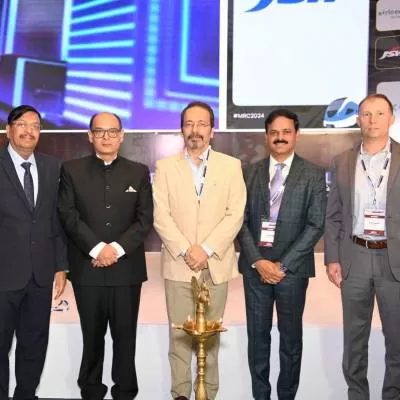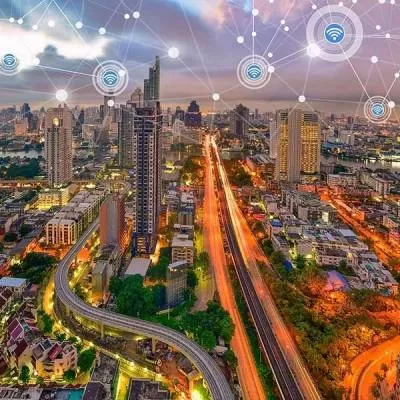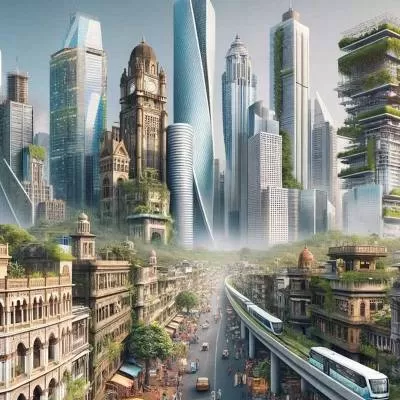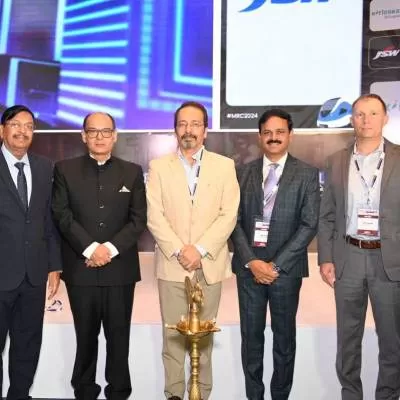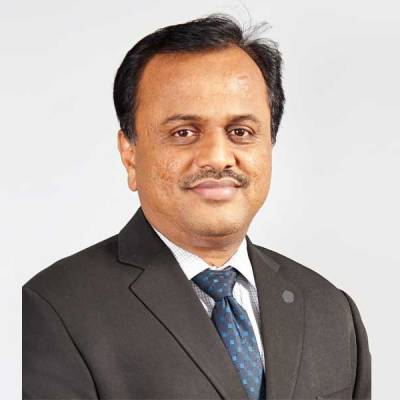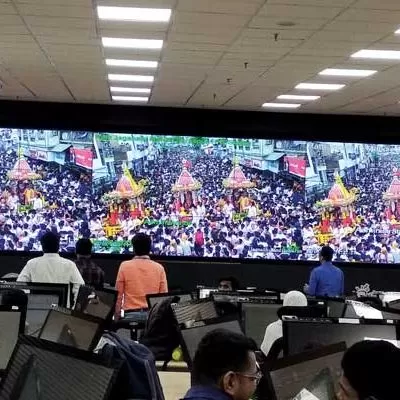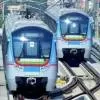- Home
- Infrastructure Urban
- SMART CITIES
- 4th Smart Cities Summit 2017

4th Smart Cities Summit 2017
Date: March 15-17, 2017
Organiser: ASAPP Info Global Group and the India China Economic and Cultural Council in partnership with the Smart Cities Council India
Winners take it all: 4th Smart Cities Summit 2017 Awardees.
With projects off the ground, the recently held summit focused on transportation, PPP, planning future cities, water and wastewater, IoT and energy.
A series of steps have been initiated by the government to set the ball rolling in its ambitious plan to create smart cities across India. This is evident from the fact that by June 2017, a total of 510 projects with a total investment of Rs 20,669 crore will take off. While Rs 1.05 lakh crore will be spent on area-based development (ABD) plans,
Rs 26,141 crore will be spent on pan-city solutions in next five years. The fourth edition of the summit brought together over 1,500 global and national policymakers, financiers and technologists, coupled with over 25 city and state representatives for a common agenda: Mission Execution.
The summit was inaugurated by Chief Guest PP Chaudhary, Minister of State, Ministry of Electronics and Information Technology, Government of India. He emphasised upon the government's Digital India initiatives. Initiatives and schemes, he said, 'such as biometric-based digital identity of citizens - Aadhaar, digital lockers, computerisation of land records, etc - are gaining momentum in India.' His address was followed by the launch of the India Readiness Guide Version 2, which is a conceptual roadmap to address growth strategies by focusing on universal principles that unite key areas of a city.
During his inaugural address, Pratap Padode, Founder Director, Smart Cities Council India, said that the country needs to build 700-900 million sq m per annum (equal to one Chicago every year) and requires 350-400 km of metro lines annually. Further, he lauded the efforts by the government on various fronts such as AMRUT, which plans to give $7.5 billion to 500 Indian cities over five years for investments in basic amenities and energy-saving measures.
'India and China share a similar context in terms of urban population and infrastructure challenges. In order to meet these challenges, China was among the first few countries to have successfully implemented the concept of smart cities and developed the requisite infrastructure to meet the urban challenges,' said Mohammad Saqib, Secretary General, India-China Economic and Cultural Council.
In his keynote address, Deepak Bagla, Managing Director & CEO, Invest India, gave the facts on Chinese investment in India.
'From 2000 to 2015, the total investment was $1.6 billion; however, since then, it has zoomed up to $30 billion,' he said. He further laid stress upon developing a new financial model to support urban local bodies for their projects as, currently, the burden has been shared between the Centre, states, and municipal corporations. In his remarks, HE Liu Jinsong, Minister & DCM, Embassy of the People's Republic of China, spoke about replicating the model of century-old cities that existed in India such as Harappa and Mohenjo-Daro. According to him, planners or authorities must think about building medium and small cities rather than large ones, as city management would be more effective then.
Meanwhile, the 4th Smart Cities Summit Chief Guest Hansraj Ahir, Minister of State for Home Affairs, Government of India, informed about the Centre's flagship Safe City and Smart Police projects.
He said,'We have proposed $333 million to make seven big cities - Delhi, Mumbai, Kolkata, Chennai, Ahmedabad, Bengaluru and Hyderabad -focus on technological advancements.'
The highlight of the three-day summit was the Role of Honour Awards for city officials, consultants and the Smart Leader of the Year. Jabalpur Smart City's CEO Gajendra Singh Nagesh was adjudged Smart Leader of the Year, based on a public vote.
Session: City Lifelines-Transport
During the session, panellists discussed the designing of BRTS, smart parking for growing parking congestion, parking apps, car pooling and transport planning. They deliberated upon the use of technology such as intelligent and integrated transport management systems, use of sensors, multi-layered parking, advanced public announcements and display systems, etc.
Session: Planning Cities of the Future
The discussion focused on preparing master plans, sustainable financial models for greenfield cities and developing more satellite cities. It centred on bringing together the natural environment, utility services and usable infrastructure. The panelist emphasised upon the need for urban planning solutions to be area-specific and threw light on issues such as space for hawkers and parking, which need to be addressed in city planning.
Session: PPP At this session, the panellists deliberated on the importance of public-private partnerships (PPPs) for smart city implementation, as 25 to 30 per cent of the plans submitted by municipal corporations are supposed to be funded on a PPP basis. Another important aspect discussed during the session was financially viable projects and the monetary constraints of the municipal corporations in executing their capacity augmentation.
Session: Planning Liveable Cities
The session focused on how to make brownfield and greenfield cities liveable. During the discussion, the panellists considered various factors including use of advanced technologies such as RFID and geo-tagging, BRTS, water management, waste-to-heat energy plants, citizen engagement, revenue enhancement of urban local bodies, use of digitisation, etc.
Session: IoT
The panel session deliberated upon the reliability of present technology, despite the Internet of Things (IoT) market being poised to touch the $15 million mark by 2020 in India. During the session, panellists discussed the importance of the link between lighting and human behaviour.
In addition, the benefits of controlled lighting with the help of IoT came across as a saviour for municipal corporations. According to the panellists, IoT and sensor devices are the buzzwords; however, these devices need to be managed and operated in a secure manner.
Session: Energy
This discussion focused on maximum use of solar energy, energy storage, intelligent street lighting, management of energy and integrated BMS. The panel pointed to energy as a key factor in the 'smart' mix. They emphasised upon the need to analyse the pattern of electricity consumption to make storage more efficient, and for buildings under construction to ensure zero wastage of energy by using proper insulation and natural lighting.
International Talk
The three-day summit concluded with Carlo Ratti, Director, MIT Senseable City Lab, Boston, making a presentation on challenges in building smart cities. This was followed by the session 'Learning from China' where six leading China-based companies - Beijing Greatwall Enterprise Institute, Prama Hikvision, Shaanxi Xintong Intelligent Technology Co, Broad Homes Industrial International Construction Co, Broad Group and Hunan KingLv Environmental Protection - presented key takeaways from China's experience of building smart cities. These included the Chinese experience on smart cities and proposals for India; making an intelligent and efficient city; new material application on civil engineering projects; low-carbon and healthy city; and the intergrated equipment and its technology application to the industry and domestic wastewater treatment. It was undoubtedly an enriching summit filled with power-packed sessions, discussions and a platform for universal networking.
For those who missed out, here is a snapshot of the proceedings:
- 72 hours of networking, business and innovation.
- Over 25 city and state representatives.
- Over 50 high-level industry speakers.
- Over 1,500 international, state and local government officials, utility heads, policymakers, financiers and technologists.
- Over 20 dedicated lessons learned and case studies discussed.
- PPP
- Planning future cities
- Water
- Wastewater
- IoT
- Energy
- PP Chaudhary
- Ministry of Electronics
- Information Technology
- Government of India
- Aadhaar
- Digital lockers
- Pratap Padode
- Smart Cities Council India
- AMRUT
- Deepak Bagla
- Invest India
- HE Liu Jinsong,4th Smart Cities Summit
- Jabalpur Smart City
- IoT
- RFID
- BRTS
- Water management
- PPP
- Smart parking
Venue: Pragati Maidan, New Delhi Date: March 15-17, 2017 Organiser: ASAPP Info Global Group and the India China Economic and Cultural Council in partnership with the Smart Cities Council India Winners take it all: 4th Smart Cities Summit 2017 Awardees. With projects off the ground, the recently held summit focused on transportation, PPP, planning future cities, water and wastewater, IoT and energy. A series of steps have been initiated by the government to set the ball rolling in its ambitious plan to create smart cities across India. This is evident from the fact that by June 2017, a total of 510 projects with a total investment of Rs 20,669 crore will take off. While Rs 1.05 lakh crore will be spent on area-based development (ABD) plans, Rs 26,141 crore will be spent on pan-city solutions in next five years. The fourth edition of the summit brought together over 1,500 global and national policymakers, financiers and technologists, coupled with over 25 city and state representatives for a common agenda: Mission Execution. The summit was inaugurated by Chief Guest PP Chaudhary, Minister of State, Ministry of Electronics and Information Technology, Government of India. He emphasised upon the government's Digital India initiatives. Initiatives and schemes, he said, 'such as biometric-based digital identity of citizens - Aadhaar, digital lockers, computerisation of land records, etc - are gaining momentum in India.' His address was followed by the launch of the India Readiness Guide Version 2, which is a conceptual roadmap to address growth strategies by focusing on universal principles that unite key areas of a city. During his inaugural address, Pratap Padode, Founder Director, Smart Cities Council India, said that the country needs to build 700-900 million sq m per annum (equal to one Chicago every year) and requires 350-400 km of metro lines annually. Further, he lauded the efforts by the government on various fronts such as AMRUT, which plans to give $7.5 billion to 500 Indian cities over five years for investments in basic amenities and energy-saving measures. 'India and China share a similar context in terms of urban population and infrastructure challenges. In order to meet these challenges, China was among the first few countries to have successfully implemented the concept of smart cities and developed the requisite infrastructure to meet the urban challenges,' said Mohammad Saqib, Secretary General, India-China Economic and Cultural Council. In his keynote address, Deepak Bagla, Managing Director & CEO, Invest India, gave the facts on Chinese investment in India. 'From 2000 to 2015, the total investment was $1.6 billion; however, since then, it has zoomed up to $30 billion,' he said. He further laid stress upon developing a new financial model to support urban local bodies for their projects as, currently, the burden has been shared between the Centre, states, and municipal corporations. In his remarks, HE Liu Jinsong, Minister & DCM, Embassy of the People's Republic of China, spoke about replicating the model of century-old cities that existed in India such as Harappa and Mohenjo-Daro. According to him, planners or authorities must think about building medium and small cities rather than large ones, as city management would be more effective then. Meanwhile, the 4th Smart Cities Summit Chief Guest Hansraj Ahir, Minister of State for Home Affairs, Government of India, informed about the Centre's flagship Safe City and Smart Police projects. He said,'We have proposed $333 million to make seven big cities - Delhi, Mumbai, Kolkata, Chennai, Ahmedabad, Bengaluru and Hyderabad -focus on technological advancements.' The highlight of the three-day summit was the Role of Honour Awards for city officials, consultants and the Smart Leader of the Year. Jabalpur Smart City's CEO Gajendra Singh Nagesh was adjudged Smart Leader of the Year, based on a public vote. Session: City Lifelines-Transport During the session, panellists discussed the designing of BRTS, smart parking for growing parking congestion, parking apps, car pooling and transport planning. They deliberated upon the use of technology such as intelligent and integrated transport management systems, use of sensors, multi-layered parking, advanced public announcements and display systems, etc. Session: Planning Cities of the Future The discussion focused on preparing master plans, sustainable financial models for greenfield cities and developing more satellite cities. It centred on bringing together the natural environment, utility services and usable infrastructure. The panelist emphasised upon the need for urban planning solutions to be area-specific and threw light on issues such as space for hawkers and parking, which need to be addressed in city planning. Session: PPP At this session, the panellists deliberated on the importance of public-private partnerships (PPPs) for smart city implementation, as 25 to 30 per cent of the plans submitted by municipal corporations are supposed to be funded on a PPP basis. Another important aspect discussed during the session was financially viable projects and the monetary constraints of the municipal corporations in executing their capacity augmentation. Session: Planning Liveable Cities The session focused on how to make brownfield and greenfield cities liveable. During the discussion, the panellists considered various factors including use of advanced technologies such as RFID and geo-tagging, BRTS, water management, waste-to-heat energy plants, citizen engagement, revenue enhancement of urban local bodies, use of digitisation, etc. Session: IoT The panel session deliberated upon the reliability of present technology, despite the Internet of Things (IoT) market being poised to touch the $15 million mark by 2020 in India. During the session, panellists discussed the importance of the link between lighting and human behaviour. In addition, the benefits of controlled lighting with the help of IoT came across as a saviour for municipal corporations. According to the panellists, IoT and sensor devices are the buzzwords; however, these devices need to be managed and operated in a secure manner. Session: Energy This discussion focused on maximum use of solar energy, energy storage, intelligent street lighting, management of energy and integrated BMS. The panel pointed to energy as a key factor in the 'smart' mix. They emphasised upon the need to analyse the pattern of electricity consumption to make storage more efficient, and for buildings under construction to ensure zero wastage of energy by using proper insulation and natural lighting. International Talk The three-day summit concluded with Carlo Ratti, Director, MIT Senseable City Lab, Boston, making a presentation on challenges in building smart cities. This was followed by the session 'Learning from China' where six leading China-based companies - Beijing Greatwall Enterprise Institute, Prama Hikvision, Shaanxi Xintong Intelligent Technology Co, Broad Homes Industrial International Construction Co, Broad Group and Hunan KingLv Environmental Protection - presented key takeaways from China's experience of building smart cities. These included the Chinese experience on smart cities and proposals for India; making an intelligent and efficient city; new material application on civil engineering projects; low-carbon and healthy city; and the intergrated equipment and its technology application to the industry and domestic wastewater treatment. It was undoubtedly an enriching summit filled with power-packed sessions, discussions and a platform for universal networking. For those who missed out, here is a snapshot of the proceedings: 72 hours of networking, business and innovation. Over 25 city and state representatives. Over 50 high-level industry speakers. Over 1,500 international, state and local government officials, utility heads, policymakers, financiers and technologists. Over 20 dedicated lessons learned and case studies discussed.




